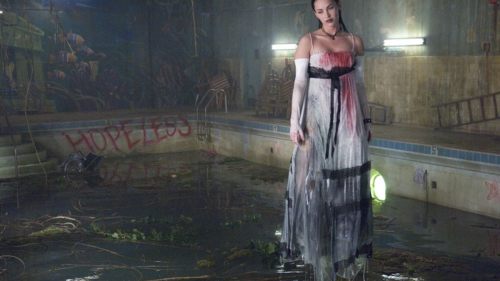RICKI AND THE FLASH Review: Off-Key, Out Of Tune, Emotionally True
Let me share with you an existential critical crisis. Ricki and The Flash is, by all the standards with which I usually judge movies, not good. It’s a structural mess, not having any kind of a third act or character arcs that work. It’s shot in such constant close-up that, even for a Jonathan Demme movie, it feels claustrophobic. And the editing is often blunt and jarring - and it doesn’t seem to be purposeful.
Yet I was moved by the movie. Deeply moved at the end by a scene that is so dramatically unearned as to approach being a parody. I found myself tearing up at a phony finale that should have had me groaning. How does this happen? How does a movie that I can objectively see is not working somehow work?
In Ricki and The Flash Meryl Streep is the titular Ricki, playing guitar and singing in a bar band deep in the San Fernando Valley. That’s what she does at night; by day she’s doing check out at a legally distinct from Whole Foods grocery store and filing for bankruptcy. It’s not much, but it’s her life.
That life is interrupted by a call from her ex - their daughter’s marriage has fallen apart and she’s taking it very hard. Ricki goes out to visit the family in the midwest, transitioning from her ratty LA apartment to an enormous McMansion, and dealing with the sons, daughter and husband she left behind decades ago to pursue a failed career in rock stardom.
What happens next never rises to the level of cliche, and Diablo Cody’s script doesn’t go for the easy targets. This isn’t about an uptight family learning how to loosen up from their wild mom, and it isn’t about the lost woman finding her way home. It’s about something more ephemeral - the power of forgiveness. But the problem is nobody figures out how to dramatize that.
Streep is terrific as Ricki, full of boozy life. She redefines being a senior, and Ricki is fully sexual and physical and alert and alive. In lesser hands Ricki would be unlikable - she simply never accepts that maybe leaving her family wasn’t the right choice - but Streep charms.
That refusal is intriguing; women never get to be the aging fuck-ups in movies, it’s always men leaving their families to find stardom or their dreams. Am I having a sexist reaction by finding Ricki’s lack of regret so irritating? I think I’m reacting more to a trope being busted - the prodigal son/father is supposed to return home to learn family is more important than work. The fact that Ricki never comes to this conclusion makes the seas of formula on which Ricki and The Flash sails choppy; that’s a good thing… when handled well. I’m not sure Ricki and The Flash handles it well.
What I think is happening at the end of the movie, where everybody just forgets all their problems with each other and starts dancing through the end credits, is that Cody and Demme are trying to make a film about sheer, unqualified forgiveness. It’s not about earning the forgiveness or demanding something in exchange for forgiveness - it is simply about giving the forgiveness, both to others and yourself. That’s part of what hit me emotionally in the finale - an almost overwhelming wave of love that comes from true forgiveness. It works - somehow! - in the film despite never being dramatized.
I have said before that cinema is alchemy, that it takes lead and transmutes it into emotional gold. Alchemy pretends to be science, but it’s really magic in the trappings of science, and that’s the movies too - you can write a million books about the mechanics of narrative and storytelling and movies and how editing works on a neurological level but none of that matters in the face of the magic. There’s magic in Ricki and The Flash, and I think some of it comes in the casting of Mamie Gummer in the role of Ricki’s daughter. The magic there is because Gummer is Streep’s real daughter.
It’s almost shocking to see a mother and a daughter onscreen who look so much like a mother and a daughter; we’re used to filling in the gaps in the genetics of onscreen relatives, but here we don’t have to, as Gummer couldn’t be anything but Streep’s daughter. She’s another character denied an arc - basically she goes from suicidal to not yet having killed herself by the time the movie ends - but her relationship with Streep feels so real that it transcends the limits of the film’s wonky structure.
So here’s the existential critical question: is a movie good even when it’s not good? Nothing in Ricki and The Flash actually works, every scene feels like it’s just left of the actual dramatics needed to truly move the characters and story along, Demme jams his camera up people’s noses, it feels like all of the movie’s big character moments have been edited out… and yet it works. There are a lot of emotions at the end of the movie, and they aren’t caused by Ricki singing Springsteen because the movie, in typical Ricki and The Flash style it’s a very deep cut off the Tracks rarities box set.
There’s alchemy in music, too. An algorithm may be able to churn out a technically perfect pop song, but there’s a human element that permeates the truly great songs in history - a beat that is slightly off, a note that is missed, a singer coming in just a little too late - that mystically elevate the music to another level. The errors and the mistakes are what makes these older pop songs better than perfect, it makes them human. It’s fitting that Ricki and The Flash is a film about a musician, because just like when a bar band plays a sweaty, messy cover of a great song, the movie’s incredible and almost endless flaws can’t get in the way of the true emotion at the core.



